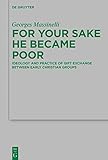For Your Sake He Became Poor : Ideology and Practice of Gift Exchange between Early Christian Groups / Georges Massinelli.
Material type: TextSeries: Beihefte zur Zeitschrift für die neutestamentliche Wissenschaft ; 251Publisher: Berlin ; Boston : De Gruyter, [2021]Copyright date: ©2021Description: 1 online resource (XII, 420 p.)Content type:
TextSeries: Beihefte zur Zeitschrift für die neutestamentliche Wissenschaft ; 251Publisher: Berlin ; Boston : De Gruyter, [2021]Copyright date: ©2021Description: 1 online resource (XII, 420 p.)Content type: - 9783110723885
- 9783110724004
- 9783110723946
- Charity -- Religious aspects -- Christianity
- Church finance -- History -- Early church, ca. 30-600
- Church fund raising -- Biblical teaching
- Money -- Religious aspects -- Christianity
- Antike Wirtschaft
- Gabe
- Paulusbrief
- Spendensammlung des Paulus
- RELIGION / Biblical Criticism & Interpretation / New Testament
- Ancient Economy
- Gift Exchange
- Pauline Collection
- Pauline Letters
- online - DeGruyter
- Issued also in print.
| Item type | Current library | Call number | URL | Status | Notes | Barcode | |
|---|---|---|---|---|---|---|---|
 eBook
eBook
|
Biblioteca "Angelicum" Pont. Univ. S.Tommaso d'Aquino Nuvola online | online - DeGruyter (Browse shelf(Opens below)) | Online access | Not for loan (Accesso limitato) | Accesso per gli utenti autorizzati / Access for authorized users | (dgr)9783110723946 |
Browsing Biblioteca "Angelicum" Pont. Univ. S.Tommaso d'Aquino shelves, Shelving location: Nuvola online Close shelf browser (Hides shelf browser)

|

|

|

|

|

|

|
||
| online - DeGruyter Expressive Space : Embodying Meaning in Video Game Environments / | online - DeGruyter Sprachpflegediskurse in Deutschland und Frankreich : Öffentlichkeit – Geschichte – Ideologie / | online - DeGruyter IJBF : Internationale Jahresbibliographie der Festschriften. Jahrgang 42, 2021. | online - DeGruyter For Your Sake He Became Poor : Ideology and Practice of Gift Exchange between Early Christian Groups / | online - DeGruyter Linien – Gesten – Bücher : Zu Henri Michaux / | online - DeGruyter Postcolonial Language Varieties in the Americas / | online - DeGruyter Religious Responses to Modernity / |
Frontmatter -- Acknowledgements -- Abstract -- Contents -- 1 Introduction -- 2 Patronage and Exploitation in the World of Paul -- 3 Multiplicity of Exchange Forms in the World of Paul -- 4 Concerns over Paul’s Collection -- 5 Paul’s Description of the Collection -- 6 Early Christian Collections in the First Three Centuries -- 7 Conclusions -- Bibliography -- Index of Names -- Index of Ancient Sources
restricted access online access with authorization star
http://purl.org/coar/access_right/c_16ec
The Pauline collection for the poor in Jerusalem is the most famous example of financial support for geographically distant groups in early Christianity. Recent assessments of the Pauline collection have focused on patronage to explain the social relations between Jerusalem and the Pauline groups and the strategies adopted by Paul. Through a comparison with the Greco-Roman world and a close reading of the texts, this study challenges the recent approach and proposes that other factors shaped Paul’s stance. Paul was interested in reassuring the Corinthians about the financial outcome of the collection and dispelling doubts that he might take advantage of them. The collection was an action modeled on divine generosity and an exchange within a reciprocal relationship between Christian groups.This study also surveys intergroup support between Christian groups in the first three centuries CE. This practice involved churches from most of the Mediterranean Basin and was known even outside of Christian circles. Transfers of money were organized according to a consistent pattern modeled on local charitable practices. The Pauline collection had similar characteristics and can be seen as part of this widespread economic practice.
Issued also in print.
Mode of access: Internet via World Wide Web.
In English.
Description based on online resource; title from PDF title page (publisher's Web site, viewed 28. Feb 2023)


